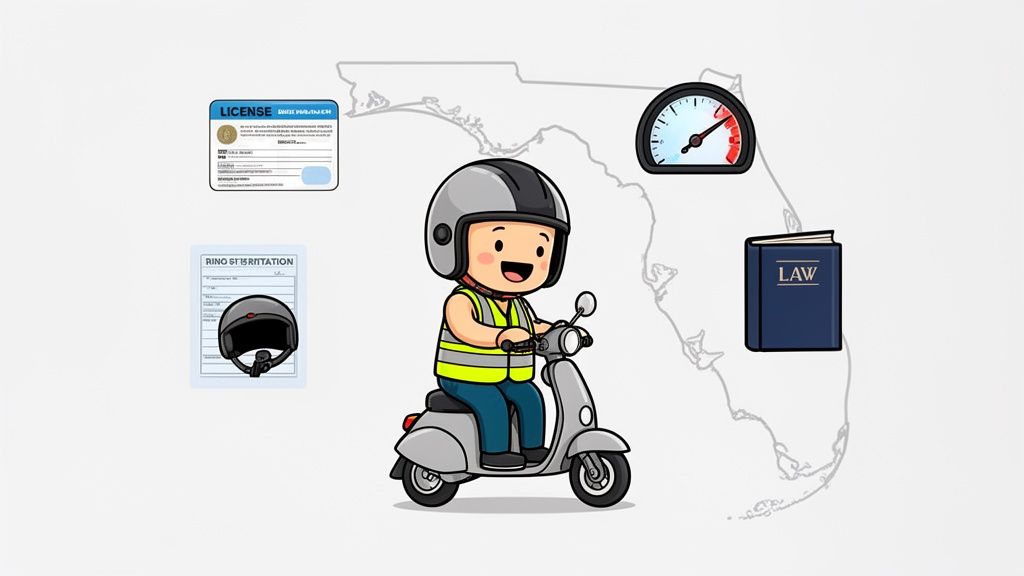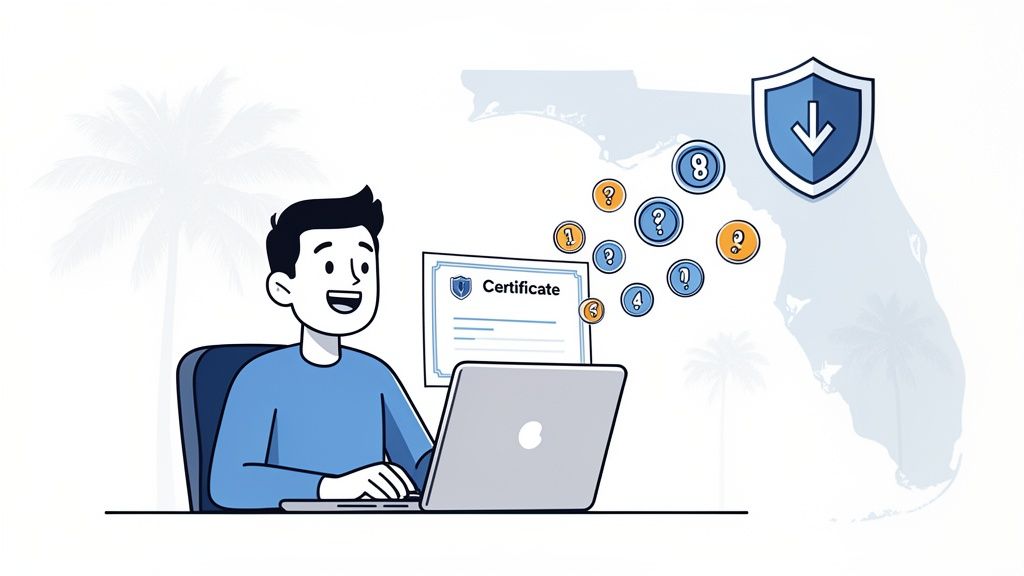Getting a traffic ticket doesn’t have to derail your driving record or insurance rates. Completing a state-approved traffic school course can help dismiss violations and keep your record clean.
At DriverEducators.com, we know that finding legitimate programs among countless options feels overwhelming. The key lies in proper verification and understanding what makes a traffic school officially recognized by your state.
What Makes a Traffic School State-Approved
State approval transforms a traffic school from a questionable option into a legally recognized program that courts and DMVs accept. The California Department of Motor Vehicles maintains strict requirements for traffic schools, with courses covering topics like recent traffic law changes, careless driving, operator responsibilities, defensive driving, and collision avoidance. These schools must submit detailed documentation, undergo regular audits, and maintain specific insurance coverage to retain their status. The Florida Department of Highway Safety follows similar protocols and requires drivers to complete traffic school courses within court-required time periods.
Official Certification Requirements
Approved traffic schools display specific license numbers that you can verify through your state’s occupational license lookup system. California requires schools to hold valid business licenses, maintain bonded instructors, and submit completion records directly to the DMV within specified timeframes. Non-approved schools lack these credentials and cannot guarantee that courts will accept their certificates.

The California DMV’s Occupational License Status Information System allows you to search by license number, business name, or location to confirm legitimacy (Florida uses a similar verification process through their Highway Safety department).
Why Approval Status Matters for Your Record
Completion of a non-approved program wastes your time and money while it leaves traffic violations on your record. California law permits drivers to attend traffic school once every 18 months to remove points, but only state-approved programs qualify for this benefit. Insurance companies typically offer discounts for completion of approved defensive driving courses, but they reject certificates from unauthorized schools. Traffic school completion saves drivers money annually in insurance premium increases that would otherwise result from traffic violations that remain on their records.
Administrative Standards and Oversight
State-approved schools must meet rigorous administrative standards that non-approved programs often ignore. These schools maintain proper student records, submit completion certificates within required timeframes, and provide customer support throughout the enrollment process. Regular state audits verify that approved schools follow curriculum guidelines and maintain qualified instructional staff. This oversight protects students from programs that might fail to deliver certificates or provide inadequate instruction that courts reject.
Now that you understand what makes a traffic school legitimate, the next step involves verification of approval status before you enroll in any program.
How to Verify Traffic School Approval Status
The California DMV’s Occupational License Lookup system provides the most reliable method for verification. Search by business name, license number, or location to confirm legitimacy within seconds. The system displays current approval status, expiration dates, and any disciplinary actions against the school. Florida drivers should use their Department of Highway Safety’s online verification tool, which requires either your driver license number, certificate number, or citation number plus your date of birth. These state databases update daily and show real-time approval status that courts recognize.
Direct Contact Verification Methods
Phone verification through your local DMV office takes 2-3 minutes and provides definitive confirmation. DMV representatives access the same databases but can explain specific requirements for your violation type.

Court clerks offer another verification route since they maintain lists of approved schools for traffic ticket dismissal. Many courts post approved school lists on their websites, though these lists update less frequently than DMV databases.
License Number Authentication Process
Every approved traffic school displays a unique license number that connects directly to state records. California schools show DMV license numbers that start with specific prefixes to identify the school type and location. Fake schools often display made-up numbers or use expired licenses from closed institutions. Cross-reference any license number through your state’s official lookup system before payment.
Red Flags That Signal Approval Issues
Legitimate schools maintain current business addresses, active phone numbers, and customer service departments that respond within 24 hours to verification requests. Schools that lack proper contact information or refuse to provide license numbers raise immediate concerns. The administrative fee for traffic school ranges from $15 to $45 (plus court fines), and approved schools always display their course provider information prominently on enrollment pages and certificates.
Once you confirm a school’s approval status, you can focus on other important factors that affect your traffic school experience and completion success.
Factors to Consider When Choosing a Traffic School
Online traffic schools dominate the market because they offer unmatched convenience and cost savings. California drivers can complete their required 8-hour course at their own pace, with most students finishing within 2-3 days while they work around their schedule. The average online course costs between $15-25, compared to $45-65 for in-person classes that require specific attendance times. Online programs allow unlimited retakes of the final exam at no additional cost, while classroom settings typically charge $10-20 for each retest attempt.
Online vs In-Person Class Options
Online courses provide flexibility that in-person classes cannot match. Students access course materials 24/7 from any device with internet connection, eliminating travel time and parking costs. In-person classes offer face-to-face interaction with instructors and immediate answers to questions, but they lock students into fixed schedules that may conflict with work or family obligations. Online platforms track progress automatically and save your place when you take breaks, while classroom attendance requires full commitment for the entire session duration.
Course Duration and Completion Flexibility
State-mandated course lengths remain fixed regardless of format – California requires 8 hours, Florida mandates 4-12 hours (depending on violation type), and Texas demands 6 hours for most offenses. Online traffic schools provide timer-based systems that track your progress automatically and allow breaks between sections without loss of credit. Students can complete online courses more efficiently than classroom versions because they skip repetitive material and focus on areas where they need improvement. In-person classes follow rigid schedules with mandatory attendance for the entire duration.
Cost Comparison and Payment Options
Administrative fees vary dramatically between providers, with some schools charging as little as $9.95 while others demand $89 for identical state-approved content. California courts require an additional $52 administrative fee regardless of which school you choose, but this amount gets added to your total rather than included in advertised prices. Payment plans benefit students who face financial constraints, though most online schools accept major credit cards and PayPal for immediate enrollment.

Compare total costs including administrative fees, materials, and potential retake charges before enrollment, as advertised rates often exclude mandatory state fees that add $40-60 to your final bill.
Final Thoughts
State-approved traffic school selection demands three essential steps: verify approval status through your state’s DMV website, compare costs and formats, then enroll with a legitimate provider. Verification prevents wasted time and money on programs that courts reject. The California DMV’s Occupational License Lookup and Florida’s Highway Safety verification tools provide instant confirmation of school legitimacy.
You must verify approval status before enrollment. Non-approved schools cannot remove points from your record or satisfy court requirements (leaving you with the original violation and additional expenses). State-approved traffic school programs cost $15-65 but save hundreds in insurance premium increases over three years.
Your school submits the certificate directly to the DMV and court within 24-48 hours after course completion. Points disappear from your record, and insurance companies often provide discounts for defensive course completion. We at DriverEducators.com help drivers develop lifelong safe habits through comprehensive education programs that go beyond basic traffic school requirements.





